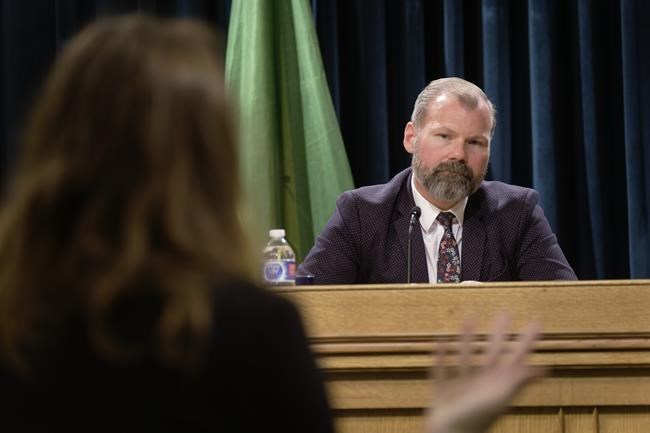REGINA — Saskatchewan's education minister says teachers must start seeking parental consent when children under 16 want to change their names or pronouns, a move that has triggered a review and been panned as harmful to LGBTQ students.
Dustin Duncan announced the change Tuesday, saying the province wanted to standardize pronoun and naming policies as they varied from one school division to another.Â
He said some parents and teachers also complained.
Human rights groups said they are concerned the change could result in outing transgender kids to parents who don't accept them.
"Some unsupportive families have kicked their kids out of the house or resorted to physical violence. Shredding the rights of students is repulsive," Harini Sivalingam, director of the Equality Program at the Canadian Civil Liberties Association, said in a statement.
"Implementing policy that could result in increased harm to vulnerable youth is disgraceful."
The association also said it would take legal measures against the province.
Saskatchewan Advocate for Children and Youth Lisa Broda said in a statement that her office will review the change to determine whether children's rights are being considered and if "there is an opportunity for discretion."
Broda said she learned of the change through the media.
"I am deeply troubled by the impact this policy will have on the rights of children in Saskatchewan," she said, adding there are significant risks to the mental and physical safety of gender diverse youth who aren't supported.Â
The Saskatchewan Federation of Labour issued a one-line statement opposing the change: "Outing children as part of a political gamble is violent and despicable."
Duncan said the Saskatchewan Party government's policy has provisions in place for children who believe they would face harm at home should their parents know their gender identity.Â
He did not outline what those protections look like but said the government will work with school divisions.Â
"If we are requiring school divisions to get parental consent to a half-day field trip to the science centre, I think we need to be treating this issue with the same amount of seriousness."
Duncan said teachers who don't receive consent from parents aren't allowed to use a student's preferred pronoun or name. Instead, they must continue to use the child's birth name.Â
However, he saidteachers won't be penalized for not following the policy.
Eric Bell, a founder of Queen City for All, an advocacy organization to promote inclusion in Regina schools, said the new policy could lead to deadnaming, a term used when a transgender child's self-identification is denied.Â
“There is no other way to describe it other than bigotry and transphobia and homophobia," Bell said.Â
Bell, who previously worked for the Opposition NDP, said transgender and gender-diverse children already face higher rates of suicide and self-harm. He's concerned the policy could result in schools no longer being safe spaces.Â
Elijah Gatin, a trans health navigator who also works with the non-profit Trans Sask, said research shows the use of chosen names and pronouns can improve youth's mental-health outcomes and decrease suicidal ideation.
Kids may stop attending school to avoid the stress of being called the wrong name, misgendered or bullied, Gatin said.Â
“We need to give kids more credit, they know themselves so well and using a different name or pronouns to explore their own unique identity shouldn’t be something that needs permission,” Gatin said.Â
When Duncan was asked at a news conference whether a child named Timmy could go by Tim under the new policy, he said it would be allowed. He said it's unclear whether a child who is not transitioning would be allowed to use another name.
"Those are all situations and scenarios that we're going to be working with school divisions so that we can provide clarity to what the policy would look like."
He said notification to parents is required if a child also has a desire to change their gender identity.Â
A similar move earlier this year in New Brunswick was faced by intense opposition by LGBTQ groups.
In New Brunswick, child and youth advocate Kelly Lamrock said the policy violated the province's Human Rights Act, the Education Act and children's Charter rights.Â
Saskatchewan's human rights code says discrimination over gender identity and gender express is against the law.
Duncan said he doesn't have all the answers.
"I try to treat everyone and, imperfect as I am in this, with respect, with kindness, to carry myself with humility," he said.
"But I also know, as minister of education, I'm responsible ultimately for nearly 200,000 children in the education system."
Opposition NDP Leader Carla Beck described the government's move as "cynical and divisive politics" and an attempt to cater to right-wing voters.
Beck said she thinks it's a response to the Saskatchewan United Party, a new right-of-centre movement, which gained traction in a recent rural byelection. It took 23 per cent of the vote, more than analysts expected.Â
"It certainly isn't a policy that is designed to improve our schools or make our classrooms more welcoming," Beck said.
She said she supports parental involvement in schools, but not outing kids.Â
"I am deeply frustrated, and frankly, angry."
Aleana Young, an NDP MLA in Regina, used profanity on social media in calling Premier Scott Moe and Duncan "cowards."
As part of naming and pronoun changes, the province also announced Tuesday new rules around sexual education.
It said that parents and guardians must be informed of a school's sexual education curriculum and given the option to decline their child's participation.
The province recently had a review done of its sexual education curriculum after Planned Parenthood inadvertently took inappropriate sexual material into a high school.Â
Duncan said schools must pause any involvement with third-party organizations connected to sexual health education.Â
This report by The Canadian Press was first published Aug. 22, 2023.Â
— With files from Kelly Geraldine Malone in Saskatoon
Jeremy Simes, The Canadian Press


.png;w=120;h=80;mode=crop)

